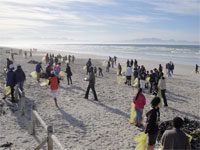
"This day is undoubtedly one of the highlights on the September environmental diary, with various activities taking place around the country in celebration of Arbor Week (1-7 September) and Clean-up and Recycle Week (16-21 September)," explains John Kieser, sustainability manager at Plastics|SA and national coordinator for the ICC.
The first ever official beach clean-up took place along the Texas shoreline in 1986 and was arranged by the Ocean Conservancy. Since then, the effort has evolved into the International Coastal Clean-up we know today with South Africa being ranked on the list of top ten participating countries. "During last year's International Coastal Clean-up, volunteers picked up more than 4,5 tons of almost every imaginable type of waste along the world's shorelines," Kieser says.
Clean-ups in Western Cape
Volunteers living in and around the Western Cape are encouraged to join major beach clean-ups that will be taking place at the following venues on 21 September, starting at 9am and ending at 11am:
However, the work doesn't stop when the beach clean-ups end. Once the volunteers go home, local coordinators are tasked with the job of collecting and compiling raw data obtained from the clean-ups in order to gain a better understanding of the types of litter found in the marine environment, such as cigarette butts, food wrappers, lost fishing nets and even major appliances.
"We analyze the data we receive after each year's cleanup and send this off to Ocean Conservancy International who uses these stats to publish the world's only item-by-item, location-by-location snapshot of marine debris in an annual report. This comprehensive look at the human handprint of marine debris helps to educate government, scientists and the public around the world," Kieser says.
"The International Coastal Clean-up is as much about preventing litter as it is about cleaning up our beaches and waterways," Kieser explains. "We believe that plastics don't litter. With the support of our partners we try to educate people that plastics don't litter, people do. It is only by understanding what is out there and how it is all connected, that we can work together on finding solutions for the growing problem of litter that travels to the ocean by way of storm drains and waterways."
For information about land-based beach and river clean-ups that will take place elsewhere in South Africa, go to the Clean-up Diary at www.cleanup-sa.co.za/cleanupdiary.htm.